Day 2 at SIEW 2024: Revisit All the Highlights and Key Insights
Day 2 of the Singapore International Energy Week (SIEW) 2024 was highlighted by the opening of Singapore-IEA Ministerial Forum and Singapore-IRENA High-level Forum, both events bringing together ministers, thought leaders and industry experts from across the value chain to discuss the pathways to a connected and sustainable energy world.
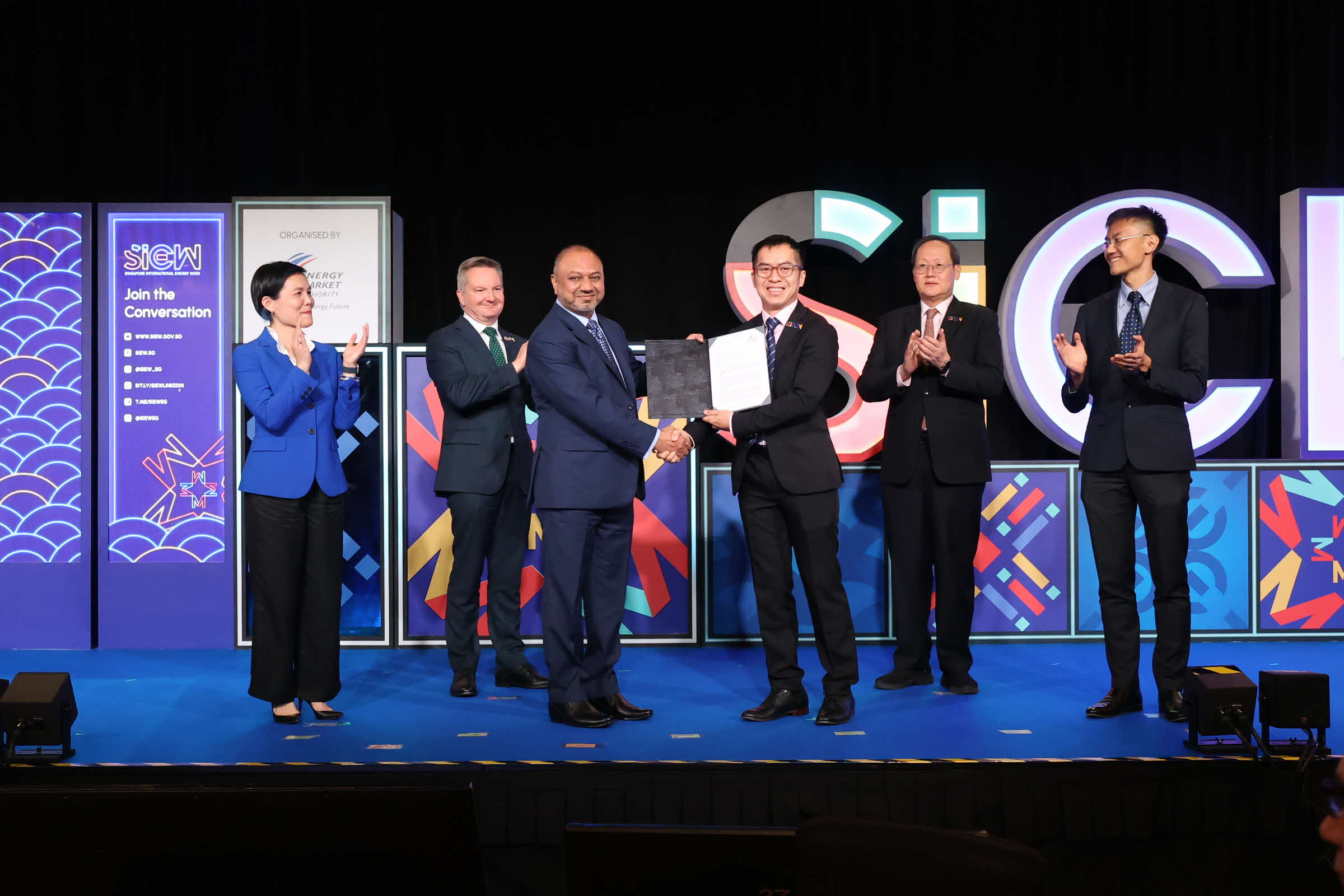
Key highlights include:
How is your SIEW 2024 experience thus far? Share your thoughts with us by taking a quick survey!
Follow us on X (formerly Twitter) and Telegram to get the latest updates.
Read more
Advario, VFlowTech and JTC Sign MOU to Accelerate Deployment of Clean Energy Storage Capacity
Advario, VFlowTech and JTC today signed a Memorandum of Understanding (MoU) to collaborate on scaling up vanadium redox flow battery (VRFB) capacity for clean energy storage on Jurong Island.
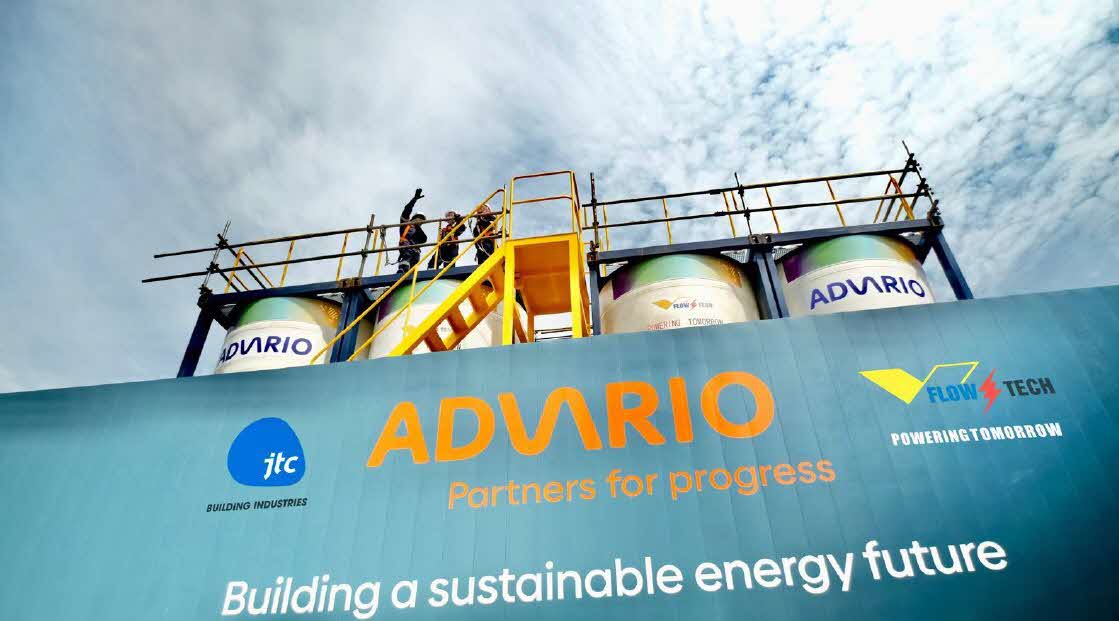
- Under the MoU, the three parties will explore using Advario’s tank infrastructure to scale VFlowTech’s VRFB technology up to 40 MWh, about 25 times its current capacity. This is equivalent to powering over 3,000 4-room HDB flats daily.
- The large-scale deployment aims to help optimise the storage of excess electricity generated across Singapore, particularly from renewable sources like solar, for use by the national grid during peak demand periods. It will help manage fluctuations in energy consumption and enhance demand response, stabilising the grid by discharging power when consumption is high and charging during periods of lower demand.
- This will ensure a more reliable and efficient energy supply as Singapore continues to increase its renewable energy generation. In addition, the vanadium electrolytes required by the large-scale flow battery could be produced from recycled industrial waste, which enhances circularity on Jurong Island.
Stay tuned for live updates! Follow @SIEW_sg on Telegram and Twitter for the latest as we dive into the conversations shaping Day 2.
Singapore-IRENA High-Level Forum: Charting the Path to Triple Renewable Energy Capacity by 2030
Contributed by Amelia Liong, EMA
At the closing panel of the Singapore-International Renewable Energy Agency (IRENA) High-Level Forum, energy leaders emphasised the importance of regional cooperation and innovation to overcome challenges and accelerate renewables adoption by 2030.
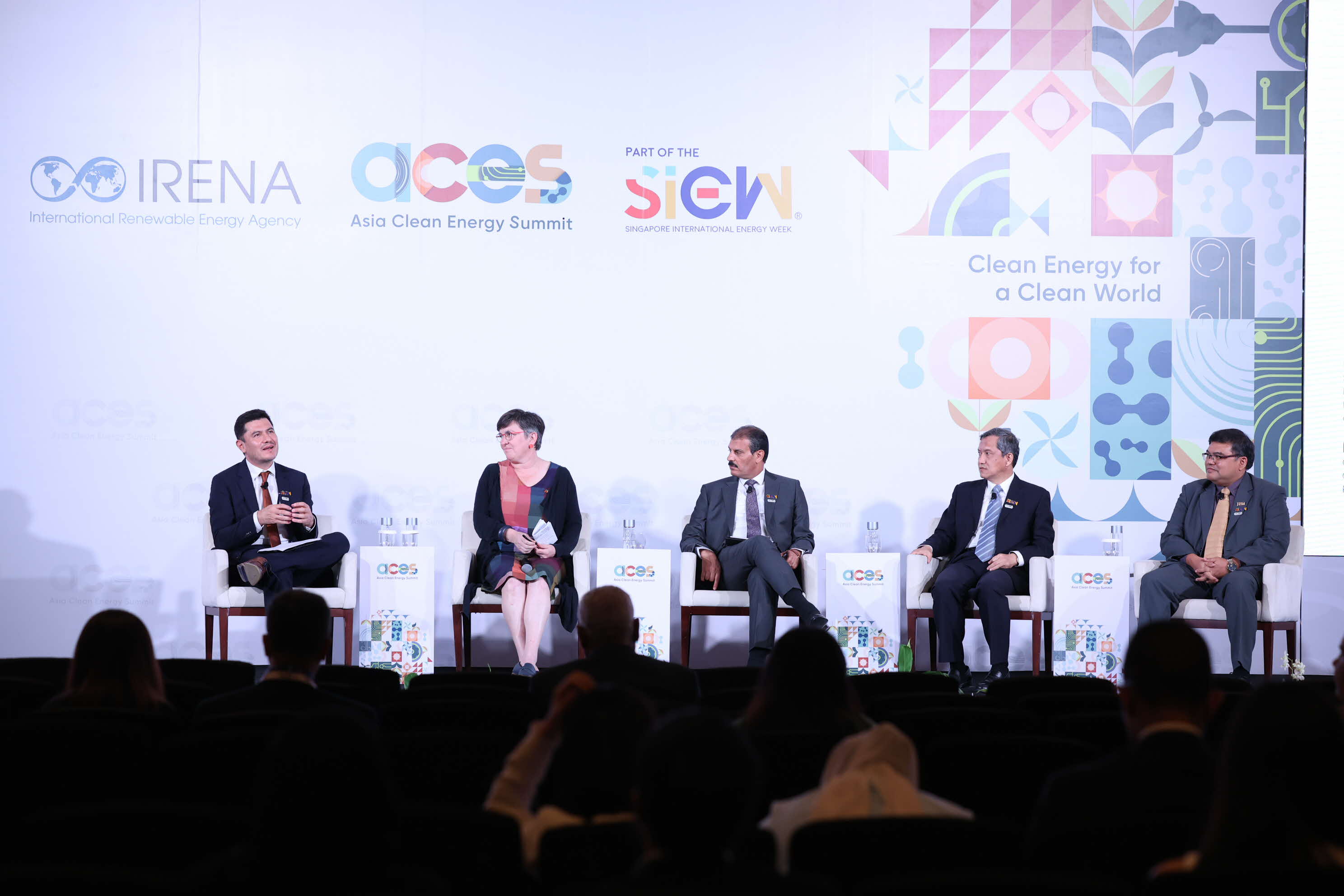
Speaking at the session were H.E. Dr Ahmed Mohina, First Undersecretary of Strategic Planning from Egypt; Clare McLaughlin, Head of Energy Performance and Security, Department of Climate Change, Energy, the Environment and Water of Australia; Dr Wang Weisheng, Chief Technology Officer, China Electric Power Research Institute; and Warit Rattanachuen, Assistant Governor, Electricity Generating Authority of Thailand.
- Strong regional cooperation and open dialogues are essential to accelerate the energy transition and address regional connectivity challenges.
- Advancements in renewable energy technologies, such as improving power output predictions and managing infrastructure, are critical for increasing efficiency and reliability.
- Regional differences demand customised approaches to the energy transition. Solutions should be tailored to meet the specific needs and challenges of each region.
- Significant investment in infrastructure and financial support is required to scale renewable energy adoption, particularly in developing regions.
Read More
Stay tuned for live updates! Follow @SIEW_sg on Telegram and Twitter for the latest as we dive into the conversations shaping Day 2.
Singapore-IRENA High-Level Forum: Unlocking Private Investment to Power Southeast Asia's Green Energy Future
At the Singapore-International Renewable Energy Agency (IRENA) High-Level Forum session, "Financing the Green Energy and Transition Activities in Southeast Asia” leaders emphasised the urgent need to unlock private investment.
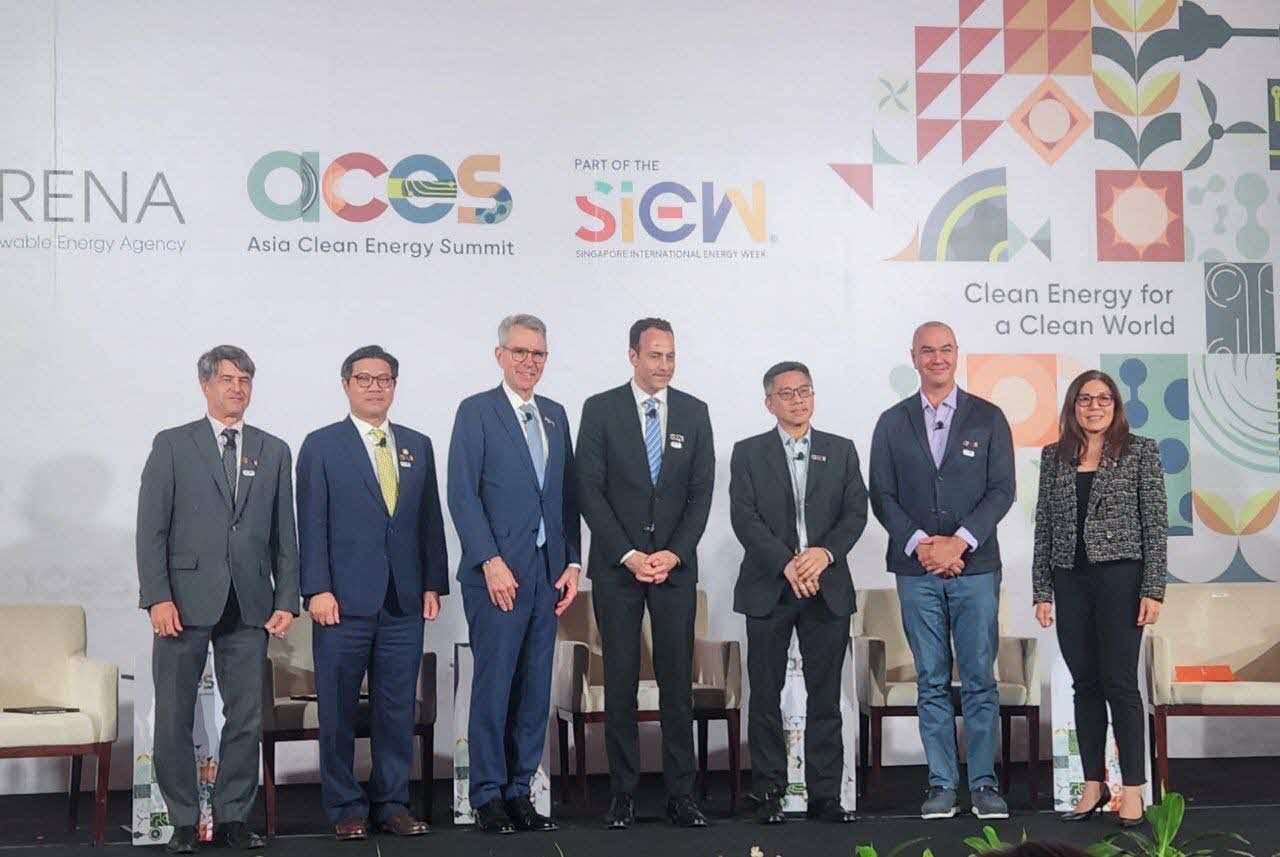
Keynote speaker H.E. Armida Salsiah Alisjahbana, Under-Secretary-General of the United Nations and Executive Secretary of the United Nations Economic and Social Commission for Asia and the Pacific (UNESCAP), highlighted the region's untapped renewable potential. Following her keynote, panellists discussed strategies to drive green finance and regulatory reforms.
The speakers comprised H.E. Frank Des Rosiers, Assistant Deputy Minister, Natural Resources Canada; H.E. Geoffrey R. Pyatt, Assistant Secretary, Bureau of Energy Resources, Department of State, United States; Ken Haig, Head, Energy and Environmental Policy, Asia-Pacific & Japan, Amazon Web Services; Audra Low, Clifford Capital Pte. Ltd. (CCPL) Chief Executive Officer & Executive Director and Group Head of Client Coverage; Frederick Teo, Chief Executive Officer, GenZero; and William Goh, Global Head of Renewable Energy, RGE.
- Renewables have seen record growth over the past few years. Yet most of the energy demand in Southeast Asia is met by coal.
- The region has an abundance of quality renewable energy resources, but realising the full potential remains a challenge due to the capital-intensive nature of these projects.
- Public funds alone won't suffice. The region must attract private-sector investment through stable and clear long-term frameworks, introduce regulatory reforms, and explore innovative green finance solutions.
Stay tuned for live updates! Follow @SIEW_sg on Telegram and Twitter for the latest as we dive into the conversations shaping Day 2.
Singapore-IRENA High-Level Forum: Building Energy Resilience in Developing Nations' Renewable Energy Ecosystems
At the Singapore-International Renewable Energy Agency (IRENA) High-Level Forum, keynote speaker Hon. Dr Doto Mashaka Biteko (MP), Deputy Prime Minister and Minister for Energy, United Republic of Tanzania, emphasised the importance of energy resilience in developing nation's renewable energy ecosystems.
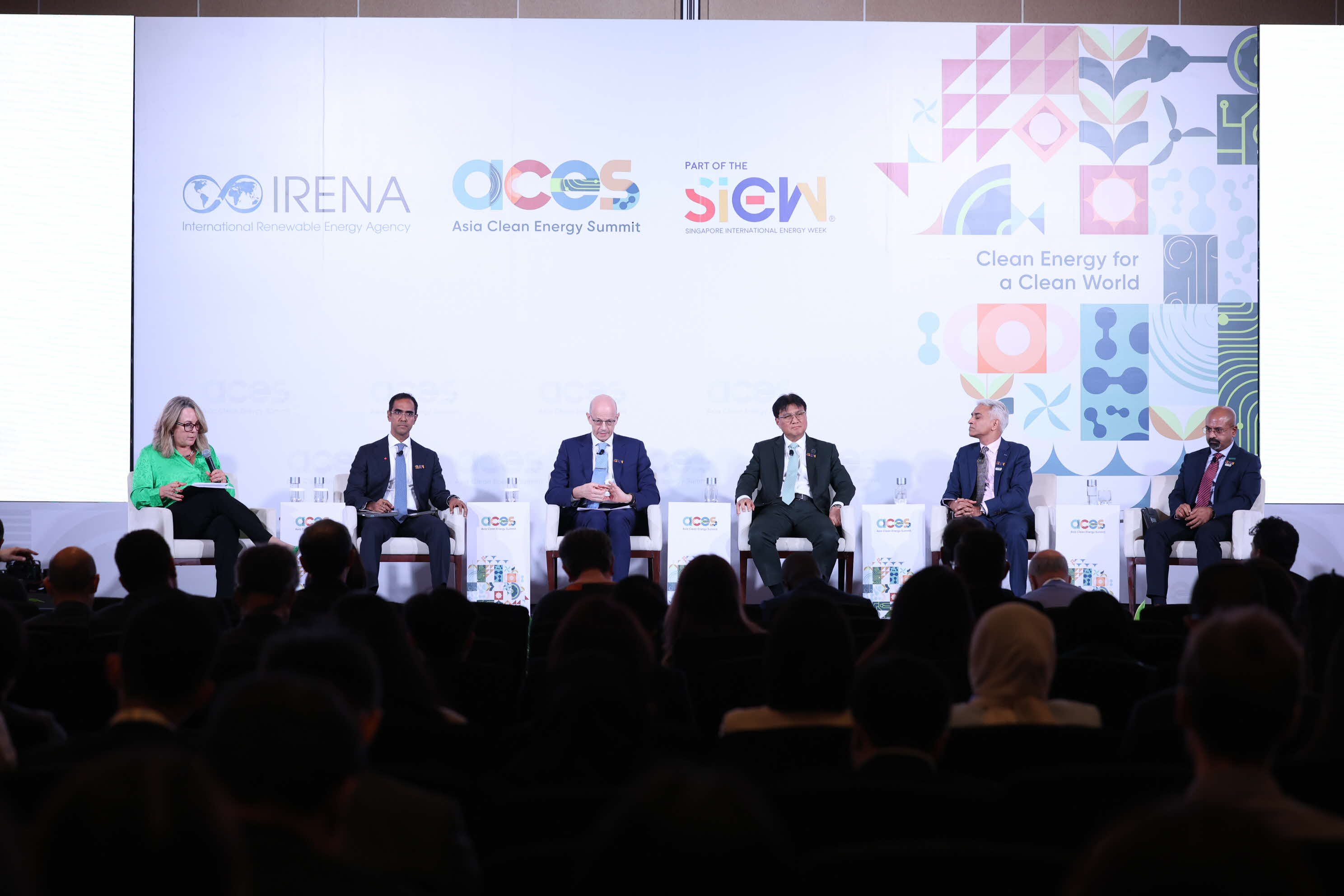
Following his address, a panel of industry leaders explored strategies to strengthen renewable energy portfolios and enhance long-term sustainability. The panel discussion moderated by Paula Conboy, Senior Counsel, Sussex Strategy Group, featured Datuk Sharbini Suhaili, Group Chief Executive Officer, Sarawak Energy; Roberto Lorato, Director and Chief Executive Officer, MedcoEnergi; Ganesh Padmanabhan, Managing Director, Head of Project Finance, Institutional Banking Group, DBS Bank; Sharad Somani, Partner, Head of Infrastructure, Asia Pacific and Head of KPMG ESG, KPMG in Singapore; and Som Shantanu, President – Engineering, Asia, Gas Power, GE Vernova.
- Energy resilience is key for developing nations. Disruptions caused by natural disasters or market shifts hit developing countries hardest, emphasising the need for stronger infrastructure and financial resources.
- Diversifying across solar, wind, hydropower, geothermal, and emerging technologies such as green hydrogen provides developing nations with more flexibility in navigating crises and seasonal challenges.
- A robust and secure energy network relies on regional energy grids, which require consensus between government and private-sector partners to drive momentum and create interconnected systems.
Read More
Stay tuned for live updates! Follow @SIEW_sg on Telegram and Twitter for the latest as we dive into the conversations shaping Day 2.
Singapore-IRENA Forum Calls for Urgent Collaboration to Triple Renewables by 2030
The Singapore-IRENA High-Level Forum opened with an urgent call for regional collaboration and investments to accelerate the energy transition, aiming to triple renewable energy capacity by 2030.
-(1)eab5a364-a54b-4d9e-8acb-220230b841fa.jpg?sfvrsn=db09ef79_1)
- Southeast Asia’s renewable potential remains largely untapped: Dr Tan See Leng, Minister for Manpower and Second Minister for Trade and Industry, pointed out that- while Southeast Asia is blessed with abundant renewable resources, this potential remains largely untapped. To fully harness it, countries must work towards greater regional energy interconnectivity.
- Infrastructure is critical for energy transition: Francesco La Camera, Director-General, International Renewable Energy Agency (IRENA), estimated that US$21.5 trillion must be invested globally by 2030 to accelerate the deployment of renewable energy, improve grid flexibility, and integrate modern energy systems. Without these investments, energy grids will struggle to handle the additional renewable capacity, creating bottlenecks in the energy transition.
- Harmonising standards is key to accelerating energy transition: Christophe Inglin, Vice Chairman, Sustainable Energy Association of Singapore (SEAS), emphasised that regional cooperation, particularly in integrating national grids and enabling cross-border energy sharing, is essential for overcoming challenges in renewable energy deployment. Countries need to align their energy targets and work towards harmonising standards to accelerate the transition
- Advancements in storage technology and smart grids will transform energy distribution: Mr Inglin also discussed how advancements in smart grid technologies and energy storage solutions will help improve energy security and reduce reliance on fossil fuels.
- China is committed to regional energy transition: H.E. Zhang Jianhua, Administrator, National Energy Administration of the People's Republic of China, shared insights on the region’s dual challenge of achieving energy security and driving energy transition. China plans to work with Southeast Asia by improving collaboration, communication, and sharing technologies.
Read More
Stay tuned for live updates! Follow @SIEW_sg on Telegram and Twitter for the latest as we dive into the conversations shaping Day 2.
Singapore-IEA Ministerial Forum: Towards Regional Harmony in Asia’s Clean Energy Push
In the Singapore-International Energy Agency (IEA) Ministerial Forum session, "Bridging the Financing Gap to Support Clean Energy Transition", global leaders discussed the urgent need for innovative financing mechanisms to accelerate the clean energy transition.
On the panel were H.E. Csaba Lantos, Ministry of Energy, Hungary; H.E. Frank Des Rosiers, Assistant Deputy Minister, Natural Resources Canada; Gillian Tan, Assistant Managing Director (Development & International), Chief Sustainability Officer, Monetary Authority of Singapore (MAS); Yuki Yasui, Managing Director, APAC, The Glasgow Financial Alliance for Net Zero (GFANZ); Elaine Lam, Group Managing Director, Head of Global Corporate Banking, OCBC Bank; and Dr Woongtae Chung, Head of the International Affairs Center, Korea Energy Economics Institute.
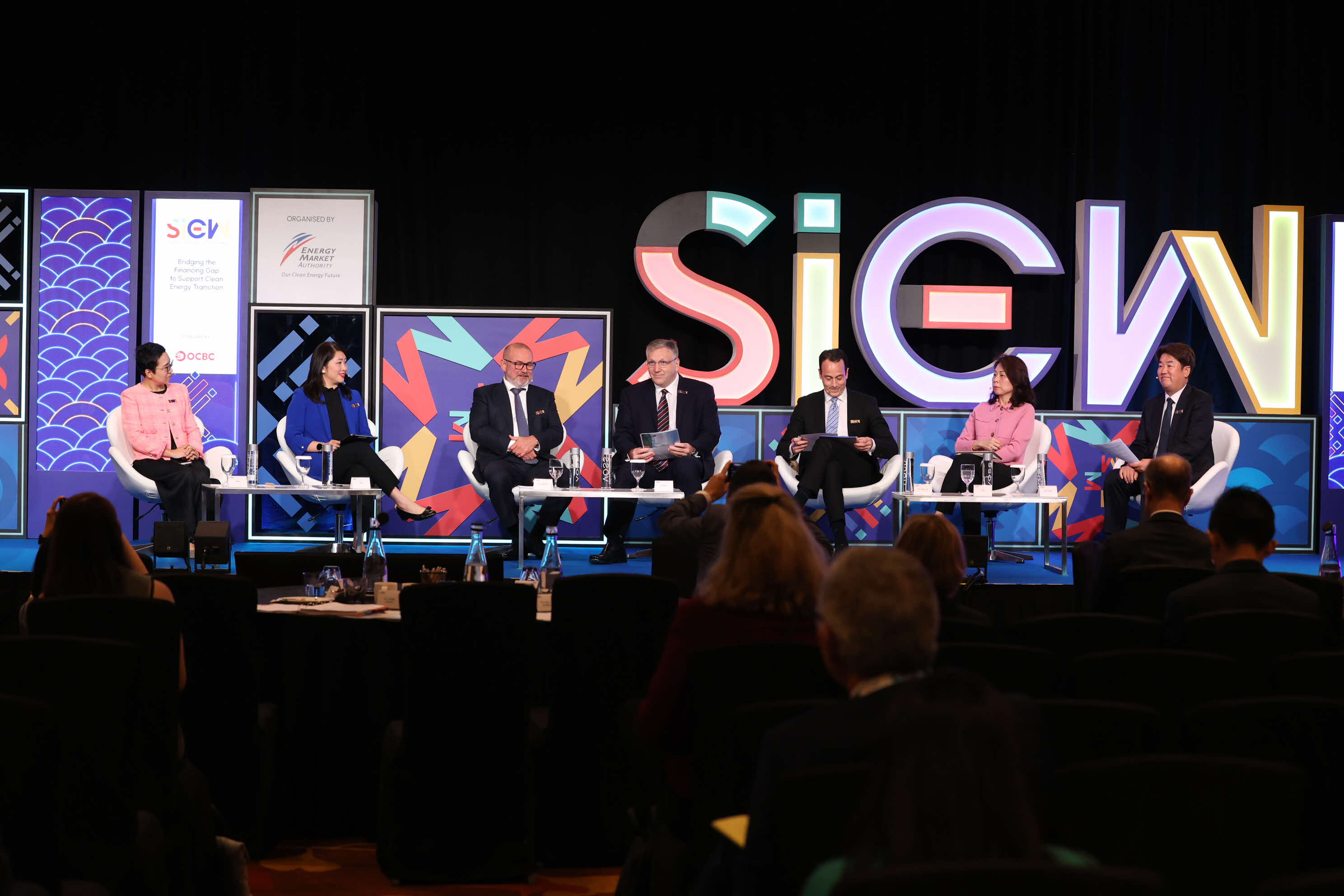
- Asia's unique energy transition challenges require harmonised standards and interoperable methodologies across the region to attract large-scale commercial investments.
- Financial institutions are developing new mechanisms to bridge the investment gap. These critical areas—data, action and ambition, and investment—are needed to close the financing gap.
- Infrastructure, particularly grid expansion and battery storage, remains a significant challenge. The speakers emphasised the need for innovative financing to support energy transition goals
Read more
Stay tuned for live updates! Follow @SIEW_sg on Telegram and Twitter for the latest as we dive into the conversations shaping Day 2.
Lao PDR Calls for Collaboration to Unlock Southeast Asia’s Decarbonisation Potential
Contributed by Amelia Liong, EMA
H.E. Phouvong Luangxaysana, Vice Minister of Natural Resources and Environment, Lao PDR, reaffirmed the country’s commitment to achieving net zero emissions by 2050.
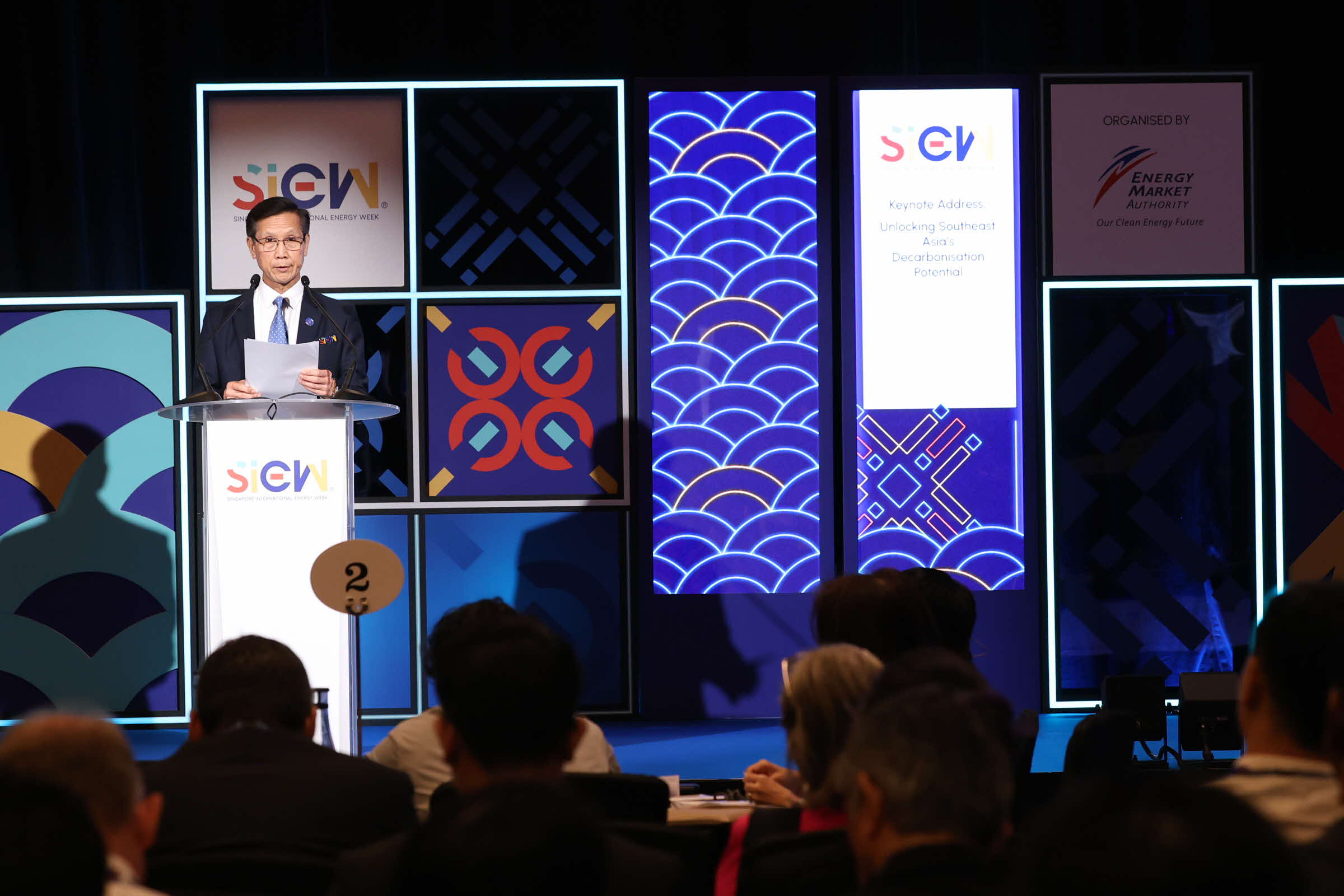
- Lao PDR recognises the urgent need to address climate change and drive the transition to a low carbon economy, targeting net zero emissions by 2050.
- With 81 hydropower plants, Lao PDR is well positioned as a clean energy production. The country aims to diversify its energy mix with solar, wind, and other renewables.
- Financing is critical for emerging economies, where capital cost of renewable energy projects is often more than double that of advanced economies. This highlights the need for innovative financing and public-private partnerships.
- Lao PDR invites global stakeholders to collaborate in unlocking Southeast Asia’s decarbonisation potential and building a resilient energy future.
Read more
Stay tuned for live updates! Follow @SIEW_sg on Telegram and Twitter for the latest as we dive into the conversations shaping Day 2.
New Decarbonisation Strategies on Our Path to Net Zero
Energy experts gathered at the Singapore-IEA Ministerial Forum to discuss decarbonisation strategies, and how the new IEA Regional Cooperation Centre can support decarbonisation efforts in Asia
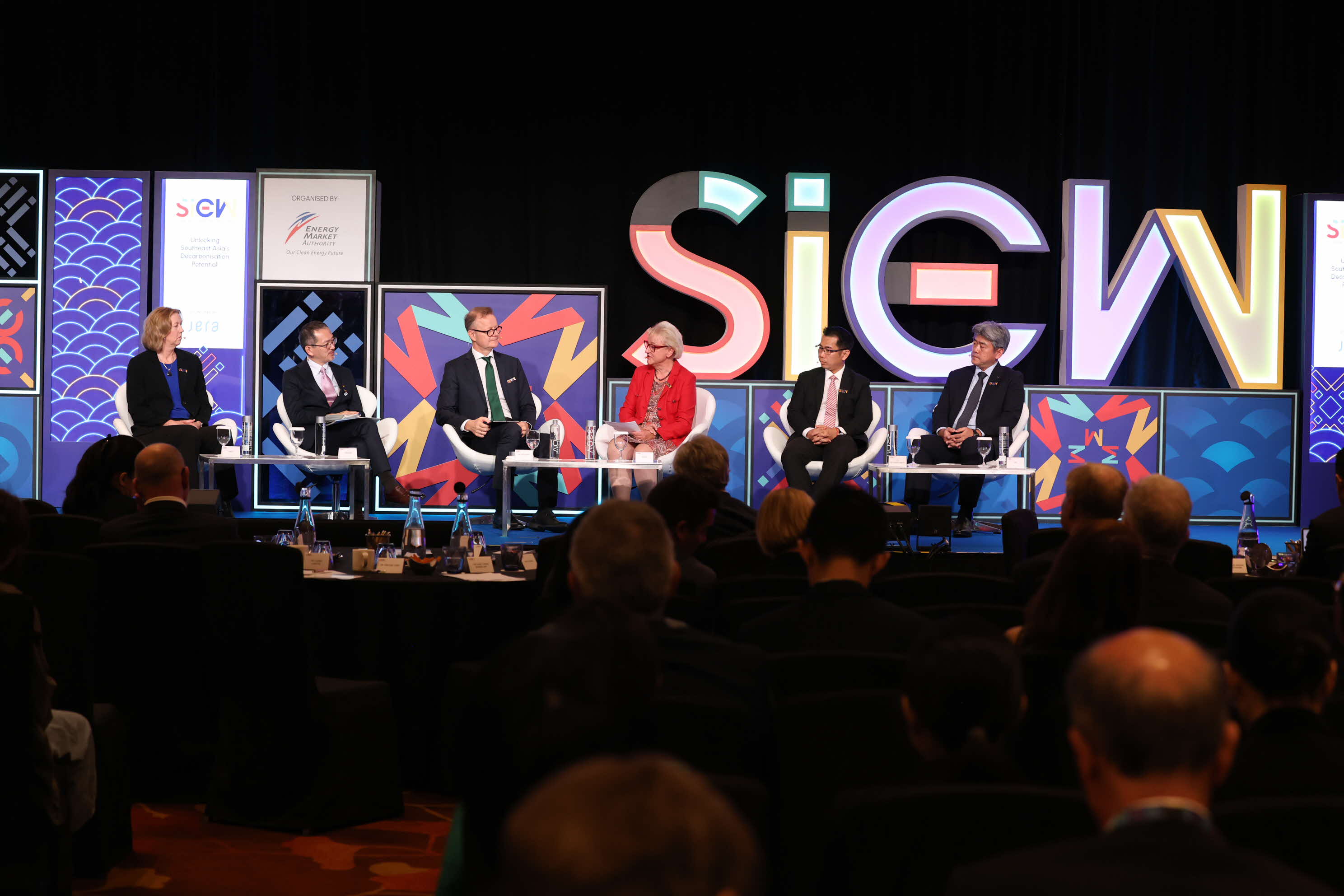
- Dr Sompop Pattanariyankool, the Deputy Permanent Secretary, Ministry of Energy, Thailand, shared his view that achieving energy efficiency — at low cost — is the first step to decarbonisation.
- The launch of the IEA Regional Cooperation Centre in Singapore can help deepen interconnectivity and foster knowledge sharing across the region.
- Meg O’Neill, Chief Executive Officer and Managing Director, Woodside Energy, described the need to recognise the different stages of economic development and resource mix in countries across Asia, to achieve the common goal of decarbonisation.
Read more
Stay tuned for live updates! Follow @SIEW_sg on Telegram and Twitter for the latest as we dive into the conversations shaping Day 2.
Singapore-IEA Ministerial Forum: Bold Leadership and Global Unity to Power the Clean Energy Future
Contributed by Danish Mirza, Singapore University of Social Sciences
In a Special Address at the Singapore-International Energy Agency (IEA) Ministerial Forum, H.E. Jennifer Morgan, State Secretary and Special Envoy for International Climate Action, Federal Foreign Office, Germany, emphasised the need for bold leadership. She highlighted that collaboration is crucial to accelerating the global energy transition and closing the climate finance gap.
Achieving energy security, climate resilience, and sustainable development requires deep collaboration across countries, industries, and sectors.
There is a large disparity between the investment needed for the green transition and available climate finance, especially for developing countries. Both public and private sectors must work together to close the gap.
Reaching the 1.5°C climate target demands bold leadership and transformative innovation. The global shift away from fossil fuels is underway. However, maintaining momentum will require rapid, large-scale changes.
Stay tuned for live updates! Follow @SIEW_sg on Telegram and Twitter for the latest as we dive into the conversations shaping Day 2.
Singapore-IEA Ministerial Forum: Regional Collaboration for Global Impact
At the Singapore-International Energy Agency (IEA) Ministerial Forum, regional leaders and the Executive Director of the International Energy Agency (IEA) shared insights on Southeast Asia's growth potential. They also highlighted pragmatic pathways needed to drive the energy transition.
-hires.jpg)
- Dr Fatih Birol, Executive Director of the International Energy Agency, in his Opening Remarks, underscored Southeast Asia's importance in global energy and climate efforts. He stressed that future energy demand must be met with climate-friendly technologies..
- H.E. Dr Andrew Light, Assistant Secretary, Department of Energy, United States, noted Singapore and Southeast Asia's potential for a clean energy revolution. He emphasised the need for tailored strategies suited to each nation's unique challenges and opportunities.
- Dr Tan See Leng, Minister for Manpower and Second Minister for Trade and Industry, Singapore, stressed the urgency of decarbonising Southeast Asia. Renewable energy accounts for less than 20 percent of the region's energy mix, he said, adding that "to realise our net zero ambitions, we must act fast, and we must act now".
- In his Keynote Address, the Hon. Chris Bowen MP, Minister for Climate Change and Energy, Australia, reaffirmed Australia’s commitment to supporting Southeast Asia's energy transition. He referenced Singapore's recent conditional approval to import 1.75 gigawatts (GW) of low carbon electricity from Australia, under the SunCable project.
- The newly established IEA Regional Cooperation Centre will provide critical policy and technical guidance to help align Southeast Asia's economic growth with its low carbon transition goals.
Stay tuned for live updates! Follow @SIEW_sg on Telegram and Twitter for the latest as we dive into the conversations shaping Day 2.
Singapore-IEA Ministerial Forum: Southeast Asia Pivotal in Global Energy Transition
In his Closing Remarks at the Singapore-International Energy Agency (IEA) Ministerial Forum, H.E. Geoffrey R. Pyatt, Assistant Secretary, Bureau of Energy Resources, Department of State, United States, emphasised Southeast Asia’s growing influence in the global energy landscape. He underscored the region's crucial role in the clean energy transition and the importance of international collaboration to meet climate goals.
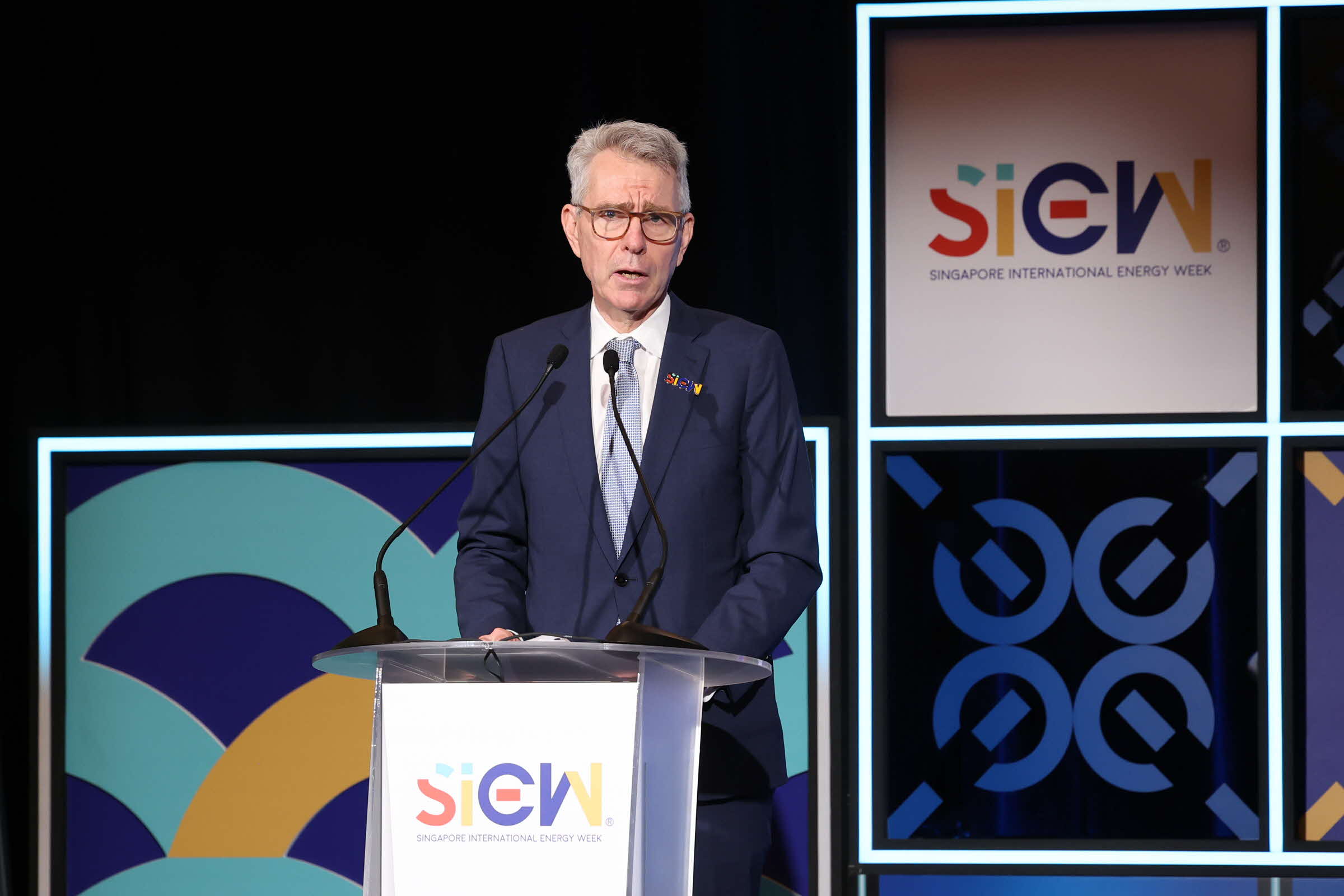
- H.E. Mr Pyatt highlighted that Southeast Asia, with 9 percent of the world's population, is on track to become the fifth-largest energy demand centre. The region is second only to India in growth.
- Southeast Asia's unique resources and strengths position it to shape its energy transition. Clean energy investments in the region reached nearly US$30 billion in 2022 and are set to grow.
- H.E Mr Pyatt reaffirmed the US’s support for scaling carbon management technologies, including carbon capture and storage. This aligns with the IEA's recommendation to limit global warming to 1.5 °C.
Stay tuned for live updates! Follow @SIEW_sg on Telegram and Twitter for the latest as we dive into the conversations shaping Day 2.
Top Takeaways from IEA's Southeast Asia Energy Outlook
Contributed by Wong Qi Wen, Singapore University of Social Sciences
Tim Gould, Chief Economist, International Energy Agency (IEA), presented the agency's sixth edition of the IEA Southeast Asia Energy Outlook at today's Singapore-IEA Ministerial Forum.
He highlighted the region's energy market potential amid global urbanisation and population growth.
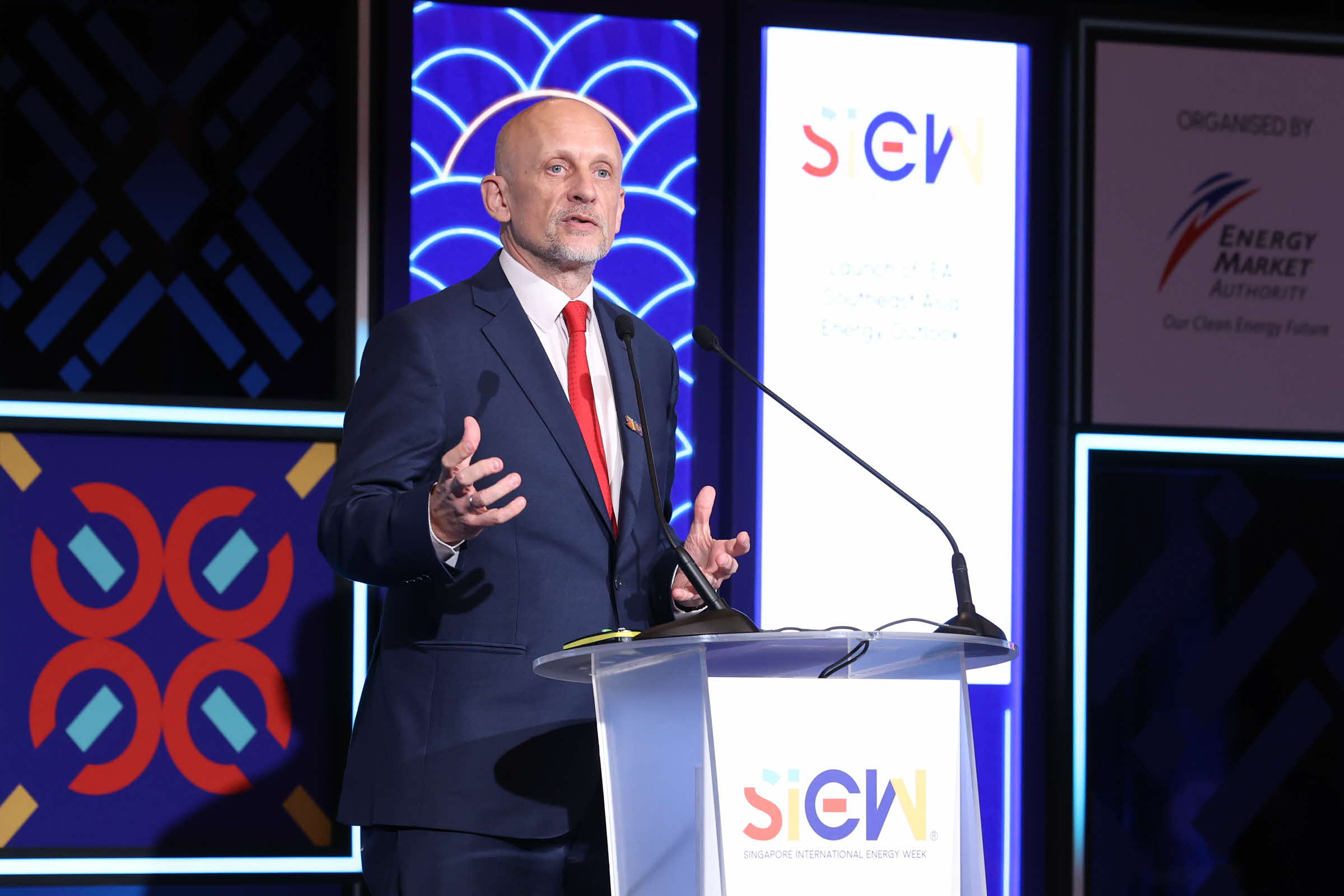
- Southeast Asia's growing urban population growth is fuelling sharp rise in energy demand, especially in the transport and residential sectors.
- Eight out of 10 ASEAN countries are committed to net zero goals, with clean energy projected to meet over one-third of future demand. This signals a shift from fossil fuels towards greener solutions.
- Scaling up clean energy requires substantial investment in infrastructure, including grids and storage. However, doing so will reduce reliance on costly oil and gas imports, and enhance energy security.
Read More
Stay tuned for live updates! Follow @SIEW_sg on Telegram and Twitter for the latest as we dive into the conversations shaping Day 2.
ACES: Singapore Advances Regional Clean Energy Integration and Cross-Border Collaboration
Dr Tan See Leng, Minister for Manpower and Second Minister for Trade and Industry, unveils key initiatives to strengthen cross-border power connectivity and regional partnerships to accelerate ASEAN’s energy transition
55bd4ce0-5020-4d90-9e47-cd48424b6a96.jpg?sfvrsn=ac0def79_1)
- As part of its decarbonisation pathways, Singapore aims to boost low carbon electricity imports from the region and develop cross-border carbon capture and storage (CCS) solutions with neighbouring countries.
- The Energy Market Authority (EMA) will grant a Conditional Approval to SunCable to import 1.75 GW of low carbon electricity from Australia’s Northern Territory to Singapore. Expected to come online after 2035, this ambitious project will complement the ASEAN Power Grid and serve as an additional source of electricity for Singapore.
- Dr Tan expressed optimism about the potential of cross-border CCS projects, highlighting the benefits of these strategic partnerships for both exporting and storage countries.
Read more
Stay tuned for live updates! Follow @SIEW_sg on Telegram and Twitter for the latest as we dive into the conversations shaping Day 2.
ASEAN Power Grid Poised to Enhance Regional Energy Security
Dr Tan See Leng, Minister for Manpower and Second Minister for Trade and Industry, shared his thoughts on regional energy collaboration and power grid expansion at the 25th Association of the Electricity Supply Industry of East Asia and Western Pacific (AESIEAP) CEO Conference, hosted by SP Group.
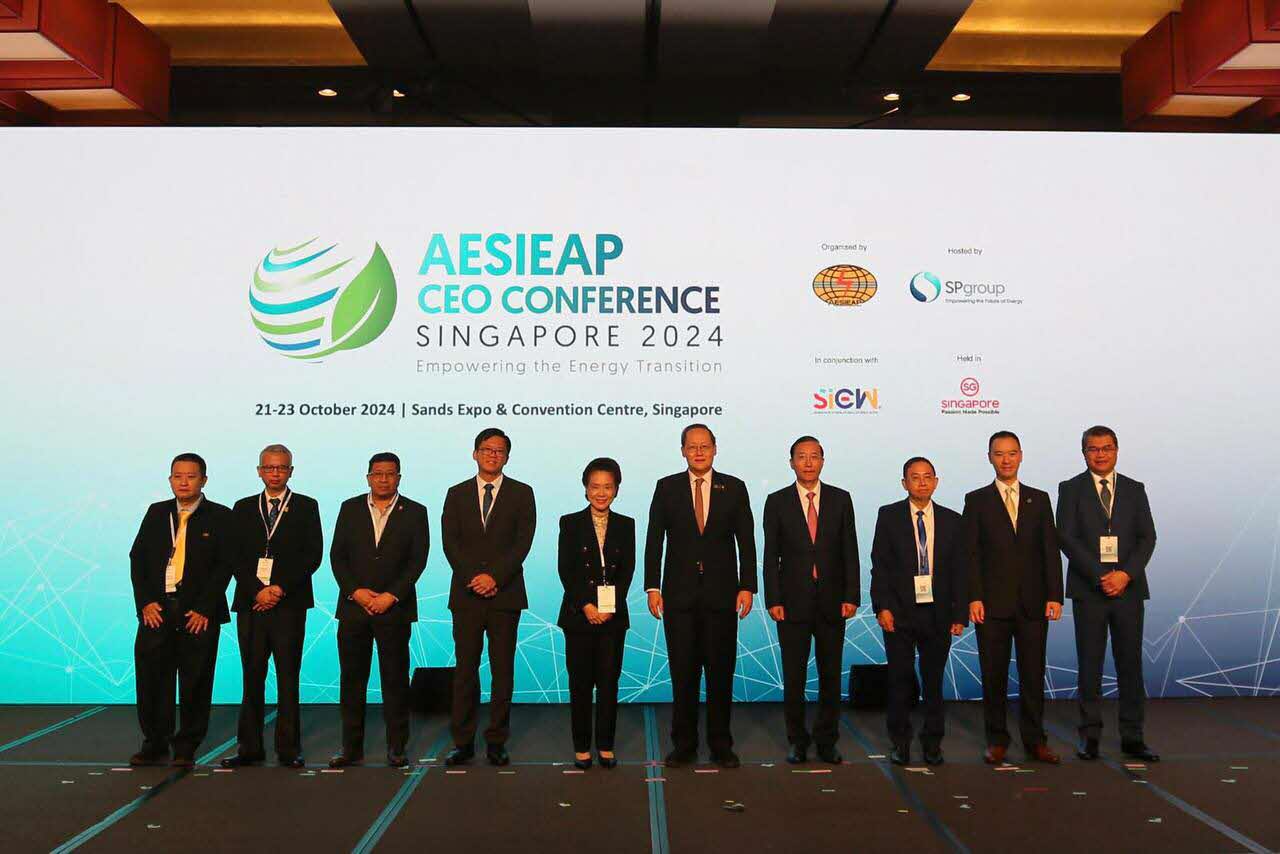
- Regional collaboration for energy transition is key: Dr Tan highlighted the importance of cross-border energy collaborations. Specifically, the ASEAN Power Grid allows renewables-rich countries like Indonesia, Laos, Cambodia, and Vietnam to export surplus energy to neighbouring countries like Singapore via subsea and cross-border interconnectors.
- Energy transition must go hand-in-hand with grid enhancements: Dr Tan said that many renewable energy sources, like solar and wind, are geographically located far from demand centres. Therefore, grid infrastructure must be expanded and upgraded to manage the intermittency of renewable energy sources.
- Singapore plans to increase low carbon electricity imports: Singapore plans to increase its energy imports to around 6 GW by 2035, with conditional approvals granted to several low carbon electricity projects. Beyond 2035, Singapore will continue to import more low carbon electricity to meet growing energy demands.
- Renewable energy projects present downstream benefits: Dr Tan shared that cross-border renewable energy projects improve project bankability, attract investments, and spur the development of manufacturing capabilities for technologies such as solar photovoltaics and battery energy storage systems.
Stay tuned for live updates! Follow @SIEW_sg on Telegram and Twitter for the latest as we dive into the conversations shaping Day 2.
Evolving Role of Natural Gas in Singapore’s Future Energy Landscape
At the opening of the S&P Global Commodity Insights Asia Gas Markets Conference, Low Yen Ling, Senior Minister of State, Ministry of Culture, Community and Youth & Ministry of Trade and Industry, highlighted the importance of natural gas as part of Singapore’s energy mix.
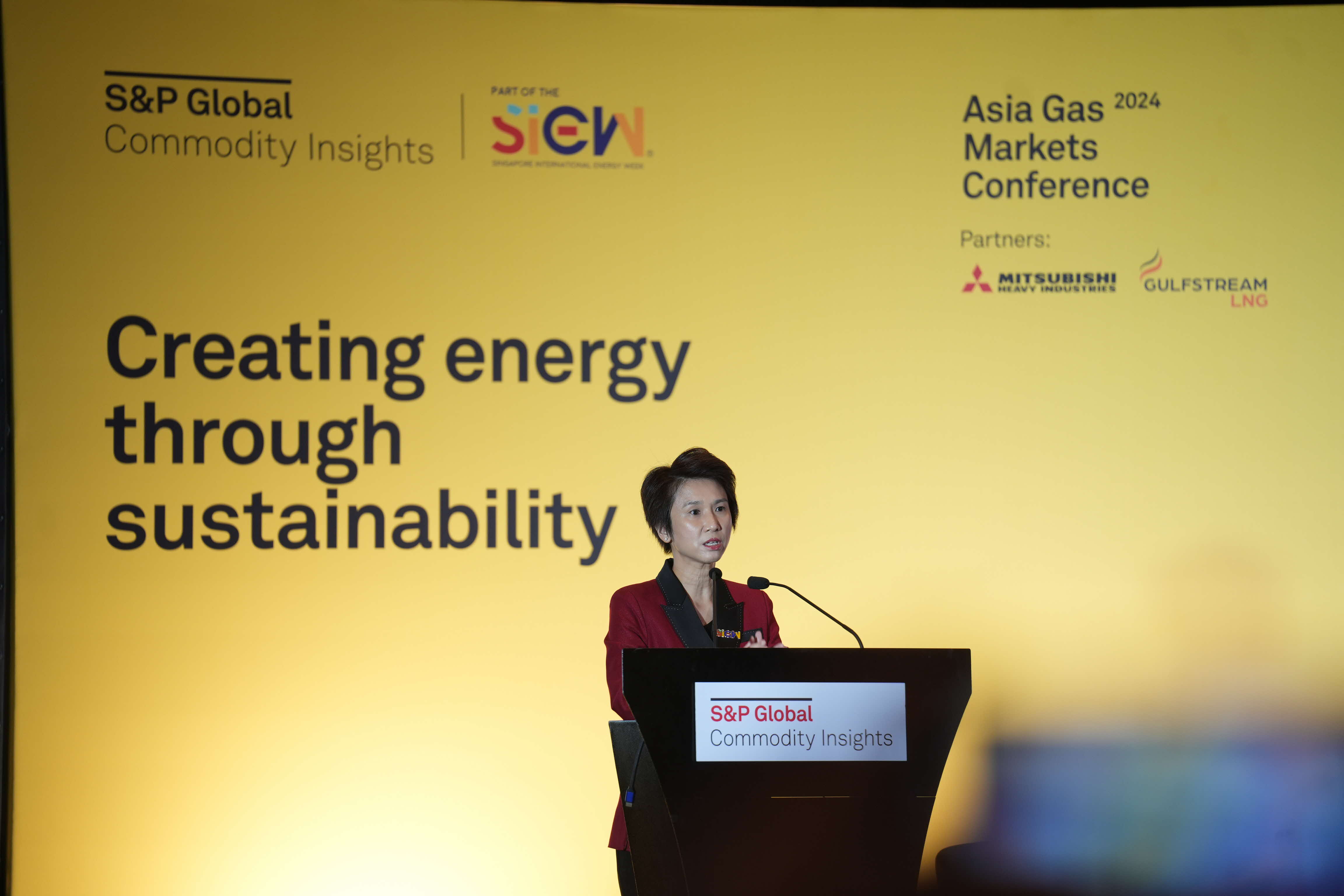
- Natural gas remains a vital transition fuel: Natural gas continues to be an essential part of the global energy mix, particularly as a transition fuel bridging the gap between fossil fuels and renewables.
- Natural gas demands will continue to surge: Global gas demand is expected to reach an all-time high of 4,200 billion cubic metres in 2024 – with the Asia-Pacific region being a key driver of the demand growth.
- Geopolitical instability will continue to impact global energy markets: The Russia-Ukraine conflict and tensions in the Middle East have contributed to unpredictable energy prices and supply chain disruptions. This means that energy markets are expected to remain tight, especially with a colder winter forecasted for late 2024.
- Singapore’s commitment to securing gas supply: A key initiative is the establishment of Gasco, a fully government-owned company tasked with procuring natural gas for Singapore’s power sector. Gasco aims to diversify the country's gas supply, while leveraging economies of scale to ensure affordability and reliability. Additionally, Singapore is planning a second liquefied natural gas (LNG) terminal to meet energy demands.
- Low carbon fuels will reshape Singapore’s future energy landscape: Ms Low reiterated that low carbon fuels such as hydrogen and ammonia will play an increasingly significant role in decarbonising the energy sector.
Stay tuned for live updates! Follow @SIEW_sg on Telegram and Twitter for the latest as we dive into the conversations shaping Day 2.
SIEW 2024 Day 2: Welcome Back to The Premier Energy Event of the Year!
Day 2 at the Singapore International Energy Week (SIEW) 2024 is set to deepen the conversations on energy transformation.
Featuring high-level officials from across the globe, the Singapore-International Energy Agency (IEA) Ministerial Forum will discuss decarbonisation opportunities and challenges in Asia Pacific and beyond. Meanwhile, the Singapore-International Renewable Energy Agency (IRENA) High-Level Forum will explore the drive to triple renewable energy capacity by 2030.
Singapore's Minister for Manpower and Second Minister for Trade and Industry, Dr Tan See Leng, will deliver a keynote at the Asia Clean Energy Summit (ACES). Now in its 11th edition, ACES supports the region's net zero ambitions. It will focus on renewable energy strategies and innovative solutions for a clean energy transition.
Ms Low Yen Ling, Senior Minister of State, Ministry of Culture, Community and Youth & Ministry of Trade and Industry, will also deliver the opening address at Asia Gas Markets Conference, where industry leaders will explore strategic solutions for navigating Asia's evolving LNG market.
Stay tuned for live updates! Follow @SIEW_sg on Telegram and Twitter for the latest as we dive into the conversations shaping Day 2.